August 31, 2025 | 16:57 GMT +7
August 31, 2025 | 16:57 GMT +7
Hotline: 0913.378.918
August 31, 2025 | 16:57 GMT +7
Hotline: 0913.378.918
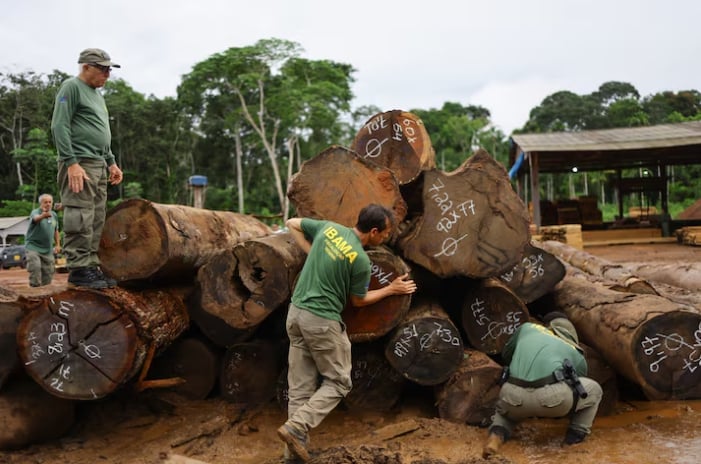
Officials from Brazil’s environmental protection agency Ibama inspect logs from the Amazon rainforest at a sawmill during an operation to combat deforestation, in Porto Velho, Brazil February 8, 2025. Photo: REUTERS/Ueslei Marcelino.
Companies around the world have poured hundreds of millions of dollars into conservation projects in Brazil designed to protect the Amazon rainforest in return for carbon credits offsetting their emissions.
Reuters found that many of those projects are profiting people and businesses fined by Brazilian authorities for destroying the rainforest.
Reporters analyzed 36 conservation projects in the Brazilian Amazon offering voluntary carbon offsets on the global market’s biggest registries. At least 24 of those involved landowners, developers or forestry firms that have been punished by Brazil’s environmental agency Ibama for their roles in illegal deforestation, Reuters found.
The offenses ranged from clear-cutting the rainforest without authorization to transporting felled trees without valid permits and entering false information in a government timber tracking system. Government officials and experts said these infractions reflected the range of roles in the illicit timber trade devouring the rainforest.
In 20 of the conservation projects, Reuters found, Ibama had fined key players for deforestation before they were listed with a carbon credit registry. In seven of those cases, the fines for illegal deforestation by the projects’ backers continued after registration.
“It’s a failure of the whole idea,” said Raoni Rajao, who ran the Brazilian Environment Ministry’s program combating deforestation until December. By paying people with a track record of violating environmental law, he said, the carbon market may be funding groups engaged in illegal deforestation.
“They might be reducing deforestation in one place, but increasing emissions somewhere else with those same resources,” said Rajao, now an environmental policy professor at the Federal University of Minas Gerais.
Brazil levies fines to enforce laws putting strict limits on deforestation since 2008 in the Amazon, the world’s largest rainforest, which has lost about a fifth of its original tree cover over the past half century. Scientists warn further deforestation could release catastrophic quantities of planet-warming carbon dioxide, accelerating climate change.
That has made the Amazon an important part of the voluntary carbon market, which was worth $7.6 billion globally over the last five years, according to market watcher AlliedOffsets.
In this market, projects that show they are reducing greenhouse emissions – for example, by avoiding deforestation in parts of the rainforest – can generate carbon credits, each one equivalent to a metric ton of carbon dioxide saved. Polluters can then voluntarily buy the carbon credits to compensate for their own emissions.
The referees setting the standards in that global market are accrediting firms such as non-profit Verra, the world’s largest carbon credit registry, and its Colombian rival Cercarbono. They run systems certifying whether a project is reducing emissions as promised.
Reuters examined thousands of pages of documents related to the 36 conservation projects in the Brazilian Amazon that had been certified by Verra or Cercarbono at the start of this year. Both provide public records of projects’ designs, boundaries and credits issued. Reporters identified key players and cross-checked them against Ibama’s database of fines.
In the case of five projects, Ibama had held their backers responsible for illegal logging inside the boundaries of their own conservation projects, rather than elsewhere.
However, Reuters did not find evidence that any of the individual carbon credit projects are failing to deliver on their pledges to reduce deforestation from a projected baseline.
Presented with the findings, a spokesperson for Verra said the credit registry “treats any allegations of illegal activities related to a project registered in one of our programs seriously” and would conduct a review of all the projects flagged in the Reuters analysis.
Cercarbono said it had opened a formal investigation of projects flagged by Reuters involving anyone with a track record of illegal deforestation to understand the potential implications.
“There is no indication that the integrity of the projects you referred to has been compromised,” a Cercarbono spokesperson said.
Buyers of credits from the projects Reuters identified include multinationals such as U.S. planemaker Boeing, Spanish telecom Telefonica and Colombian oil producer Ecopetrol. Buyers typically rely on accrediting firms for quality control.
Boeing said it had acquired carbon offsets that met widely recognized science-based standards. Telefonica said it is part of a corporate working group that aims to strengthen the integrity of the voluntary carbon credit market. Ecopetrol declined to comment.
Brazil’s Environment Ministry, which oversees Ibama, said the agency’s enforcement database offers a reliable public record of environmental infractions, which “can and should” be used to verify the effectiveness of conservation projects selling carbon credits.
One of the biggest names in the Brazilian carbon credit market over the past five years was Ricardo Stoppe Junior. He was arrested in June 2024, as part of a federal police probe called “Operation Greenwashing”, accused of leading a vast illegal logging scheme.
Stoppe billed himself for years as the world’s leading carbon credit entrepreneur – a Brazilian doctor who said he put aside saving lives to help save 10,000 square kilometers of the Amazon rainforest. Since 2020, he has sold an estimated $15 million worth of credits, according to public transactions data and prices tracked by AlliedOffsets.
Stoppe’s success in the carbon market came despite public records showing Ibama fines against him and his partners since 2014 for deforestation-related offenses.
A confidential 302-page police report, reviewed by Reuters, documents how authorities concluded he used his carbon projects to fund a criminal scheme that bribed public officials to forge land titles and launder more than a million cubic meters of illegally felled rainforest timber.
A federal judge ordered the preventative arrest of Stoppe and four associates last year for their alleged roles in a criminal organization responsible for illegal logging and land grabs, freezing $300 million of their assets. Lawyers for all five disputed federal police accusations and denied wrongdoing by their clients. They have since been released to house arrest, awaiting charges by prosecutors. Prosecutors declined to comment on the confidential case.
In his first interview after five months in jail, Stoppe denied taking part in a criminal venture. He told Reuters his projects brought legal rigor and environmental protection to a part of the rainforest plagued by people who illegally seize land.
“There’s no state out there. No police. Nothing,” Stoppe said. “It’s like the Wild West.”
He attributed the allegations against him to failed oversight by business partners and bad faith by investigators. He denied taking part in illegal deforestation.
Two decades ago, Stoppe bought a remote tract in southern Amazonas state, named for “Our Lady of the Ituxi Waterfalls,” after cascades considered sacred by neighboring Indigenous communities.
“My plans were to clear it and raise cattle,” Stoppe said.
He said that changed after a near-death experience in the jungle, when a branch knocked him off his horse. After nearly a week in a coma, he said, a revelation came to him that he did not want to cut down the rainforest.
Stoppe turned the forest around the ranch into his first conservation project in the carbon market, called “Fortress Ituxi,” which he registered in 2020 with global certification body Verra. At the time, Ibama had already fined him twice, totaling more than 125,000 reais ($23,000) for falsifying information in Brazil’s timber tracking system.
Two years later, he had recruited neighboring ranchers for a second project, called “Unitor,” pledging to protect a swathe of rainforest between the Iquiri National Forest and the Kaxarari Indigenous Territory. By the time he registered that second project, Stoppe and two other landowners involved had racked up seven Ibama fines worth over 8.6 million reais, including for clearing native rainforest and grazing cattle on deforested land.
Brazil’s Environment Ministry did not comment on the specific cases involving Stoppe and other landowners.
The proposal Stoppe submitted to Verra for Unitor underscored its benefits by warning of “criminal organizations that invade lands in the federal public domain to deforest and commercialize illegally harvested wood.”
A sales pitch of this kind is at the heart of many carbon credit projects that Reuters reviewed. Under common methods for generating credits from conservation, the worse the surrounding threat, the greater the value of any avoided deforestation.
But police allege Stoppe was selling the fix to a problem of his own creation.
The federal police report, which cites wiretaps, bank records, land titles, logging permits and satellite imaging, describes how the scheme allegedly worked.
Stoppe and his associates bribed public officials to invent land claims inside the national forest and other public land, turning them into private estates that they eventually grouped into carbon credit projects, police allege in the report.
Those conservation projects also provided an easy way to cover up illegal logging on a massive scale, according to the police report. The group registered “forestry management plans” for their projects under a state program that grants permits for selective logging to thin a standing forest.
But Stoppe and his partners used the state logging permits earmarked for their project areas to launder wood they extracted illegally elsewhere, police say. Lumber with legal permits in the Amazon is worth several times the value of undocumented wood.
In an interview with Reuters, lead police investigator Thiago Scarpellini said Stoppe was the ringleader of a scheme that facilitated illegal logging from nearby public lands such as the neighboring Kaxarari reservation. He said Stoppe was “the target of this investigation, but he’s not the only one working this way.” He did not elaborate.
Scarpellini’s team of investigators compared logging permits to satellite images of Stoppe’s projects and found they had generated enough fraudulent permits to launder more than 1.1 million cubic meters of illegal timber, according to their report.
Stoppe said he would prove in court the legitimacy of all land claims in his name and denied taking part in any illegal logging in the area.
After Stoppe’s arrest, the Verra registry put his projects on hold.
President Luiz Inacio Lula da Silva is working to position Brazil as a global leader in “green” development, which will be in the spotlight when the country hosts the United Nations climate summit in November.
Seeking to meet its commitments under the 2016 Paris Agreement on climate change, Brazil passed a law last year to create a government-regulated carbon market in the country, like those in Europe, China and California.
As it takes effect in coming years, the law will require Brazilian industry to reduce greenhouse emissions or pay to offset them in a regulated market, which will include conservation projects selling carbon credits.
The government is also encouraging carbon credit projects that actively restore damaged biomes rather than pay landowners for avoided deforestation.
The Reuters findings about Brazil’s existing voluntary market are “very serious” and underscore challenges confronting regulators setting up the new market, said Cristina Reis, the deputy secretary for sustainable economic development at Brazil’s Finance Ministry.
After registering the Unitor conservation project with Verra, Stoppe and his partners were hit by Ibama with 18 more fines, for razing 42 square kilometers of the rainforest and falsifying the origin of some 180,000 cubic meters of timber, among other infractions.
Some of those offenses were inside the bounds of Stoppe’s carbon credit projects, according to a Reuters analysis of Ibama’s fines, which were levied independently from the police investigation.
Edivan Kaxarari, a community leader from the nearby Indigenous territory, said some locals had reservations about Stoppe’s promises to protect the forest – and they turned down a chance to collaborate on a carbon credit project.
Maps in the documentation of Stoppe’s carbon credit projects filed with Verra show he and his partners had staked claim to land on Bull Road, a local artery which also passes other ranches and the Kaxarari reservation.
On a two-hour drive with reporters down the dusty road to the gates of Stoppe’s Ituxi ranch, Edivan surveyed the vanishing forests on his people’s ancestral lands. For miles and miles, lush rainforest had been slashed and burned, giving way to scrubby pastures speckled with white Zebu cattle. Ibama’s enforcement database showed the agency had punished Stoppe and his partners at least six times for illegal deforestation along Bull Road.
After watching the illegal logging advance for years, Edivan said his guard was up when people he described as “white men” visited the reservation a couple years ago preaching the environmental benefits of Stoppe’s carbon credit projects and proposing a project on Kaxarari land.
Stoppe confirmed he had started discussions with the Kaxarari about partnering on a carbon credit project.
“They came with this carbon project proposal and they mentioned what had been done there on the Ituxi ranch with Dr. Ricardo,” said Edivan, who took part in the meeting. “They didn’t give us much time to accept.”
Edivan said he and other community leaders had concerns about the proposal, so they held off.
“If a person is working on this carbon project, then why is he deforesting?” he said. “There’s something wrong there.”
(Reuters)

(VAN) Researchers have discovered that replacing 50g/kg maize with a 50:50 mix of pineapple and orange peels could offer poultry producers a sustainable feed option.
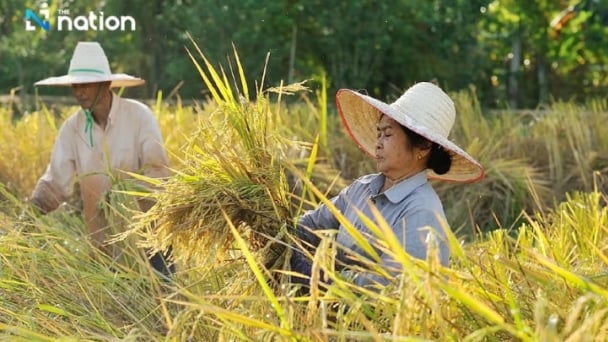
(VAN) Global rice markets are bracing for turbulence after reports that India, the world’s largest rice exporter, is preparing to release around 20 million tonnes of stockpiled rice in September.
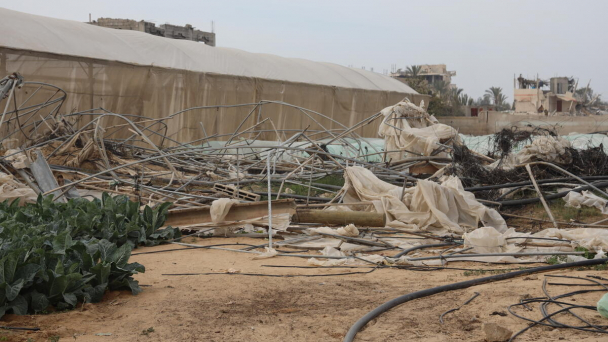
(VAN) FAO, UNICEF, WFP and WHO reiterate call for immediate ceasefire and unhindered humanitarian access to curb deaths from hunger and malnutrition.
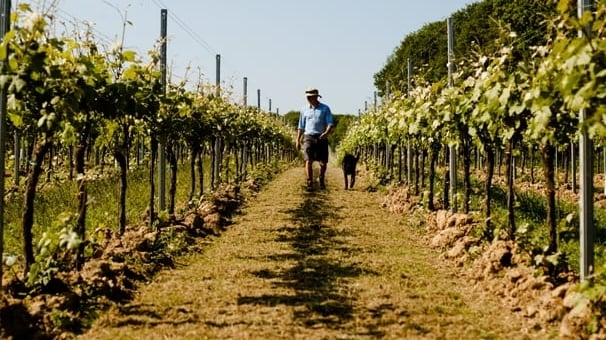
(VAN) As wildfires rage in southern Europe and crop losses only set to increase in the coming years, producers are getting creative to beat the heat.
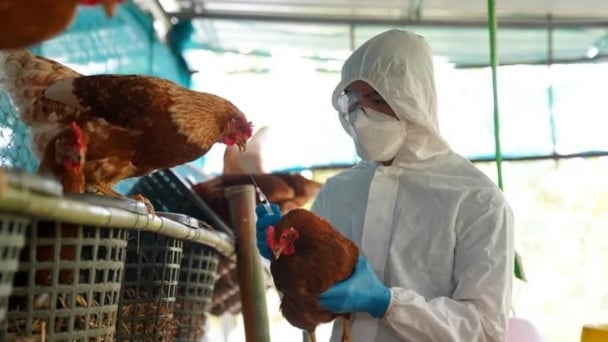
(VAN) A new outbreak of highly pathogenic avian influenza (HPAI) has been confirmed by Argentinian authorities at a layer farm in Buenos Aires, Argentina.
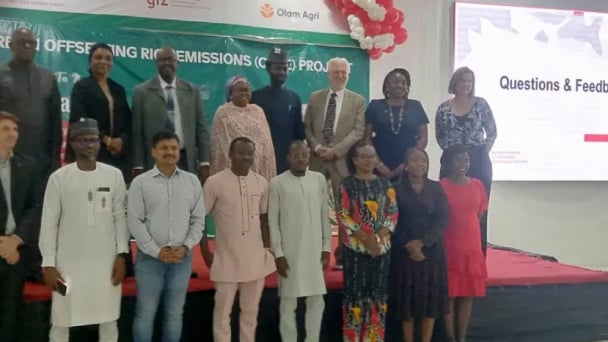
(VAN) The German Government has inaugurated the Carbon Offsetting Rice Emissions (CORE) Project to support 12,000 smallholder farmers in climate-smart rice production across Benue, Nasarawa, and Kano States.
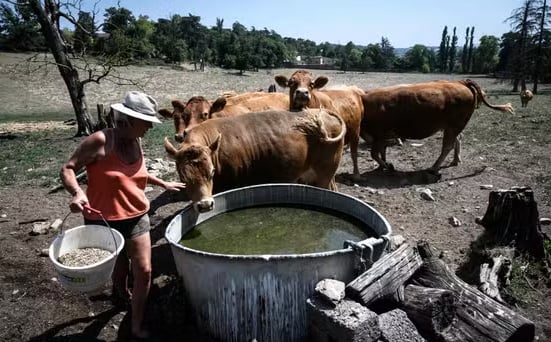
(VAN) Orchardists, winegrowers and livestock farmers fear the negative impact of the current heatwave on their production.